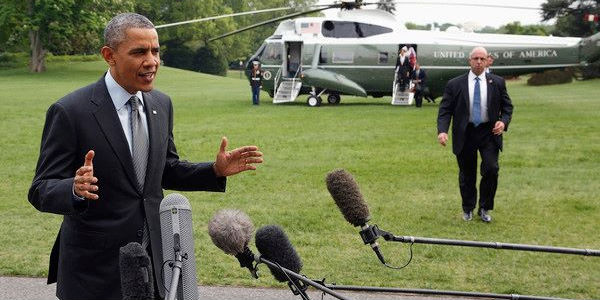I’ll avoid the writerly temptation to milk a suspenseful headline for several paragraphs, and come right out and say it: How are we going to pay for all this?
Videos by Rare
As America sets the table for yet another war—or a “significant counterterrorism operation,” if you’re consulting the State Department—there’s been little discussion about that pesky price tag dangling off the side. Wars cost money, after all, and the government’s pockets are a bit empty at the moment.
So far the Center for Strategic and Budgetary Assessments (CSBA) estimates that the air campaign, which has been active for about a month and a half, has cost between $780 million and $930 million. If the war remains limited to modest bombings, the financial damage will be between $200 and $320 million a month. For a wastrel government that will spend $3.7 trillion this year, that’s a bargain.
The problem is that no one seriously believes airstrikes alone will destroy ISIS. For a more extensive operation, say 25,000 troops on the ground, the cost would surge to between $1.1 billion and $1.8 billion a month. Boots on the ground are particularly expensive, and while President Obama is adamant about limiting American involvement against ISIS, he’s already deployed 1,600 military “advisors” to Iraq with more likely to follow.
If America succumbs to mission creep, as many analysts believe we will, then our obligations will grow and so will the costs. And even if we keep our troop presence minimal, accountants have a nasty habit of lowballing the numbers. The Bush administration initially estimated that the entirety of the Iraq war, including the nation-building phase after Saddam was deposed, would cost between $50 billion and $60 billion. In reality we spent between $2 trillion and $4 trillion on Iraq, depending on whose estimates you trust.
Soldiers have to be paid. Wounded veterans have to be treated. Equipment has to be replaced. The debt accrued to pay for all this has to be serviced. And that’s without getting bogged down in yet another post-war occupation.
The dependably hardheaded General Martin Dempsey was asked recently whether the military would need more money to fight ISIS. He replied:
When we submitted the budget last year…the Joint Chiefs all said we could accomplish the nation’s security needs with that budget with certain assumptions. One of them was that the number of commitments would either level off or come down. And secondly, that we would get some flexibility in the budget to change paid compensation, health care, retire weapons systems and infrastructure. Commitments have gone up. The things that we were looking for in terms of flexibility have only very minimally been delivered.
Dempsey acknowledged that the military is drawing down its presence in Afghanistan and could thus dump some of the savings into the war with ISIS. But this, he noted, was little more than “gas money.”
He concluded: “So if you’re asking me do I assess right now, as we go into the fall review for ’16, that we’re going to have budget problems? Yes.”
That means more money from the cash-strapped Treasury. The national debt currently stands at $17.8 trillion, up $800 billion from this time last year. Congress already canceled most of the scant savings from sequestration that were helping to bring down the deficit, thanks to last year’s craven Ryan-Murray budget deal. A new war with ISIS will mean not just negating the sequester, but spending enough to shift the military back onto a wartime footing.
Entitlement spending and interest on the debt is already projected to consume every penny of federal revenue by 2030. If the government wants to tack another war onto its list of obligations, then it needs to tackle Social Security and Medicare posthaste. Otherwise the deficit is going to explode.
Back in 2011, there was a brief glimmer of financial prudence in Washington. Simpson-Bowles was convened, the Budget Control Act was passed, sequestration’s supposedly sharp teeth cast jagged shadows over the Capitol. Now the political class has shifted back to its default mode of spending like lunatics and not giving a damn about the consequences. That we’ve been discussing war in Syria for nearly a year with barely a murmur about its costs shows how fleeting any concerns over the deficit really were.
Admiral Mike Mullen has said in the past that debt is our number one national security threat. Maybe that’s still true and maybe that isn’t. But before we start launching ordnance into the hurly-burly of another labyrinthine Middle East conflict, we should at least calculate its costs.



